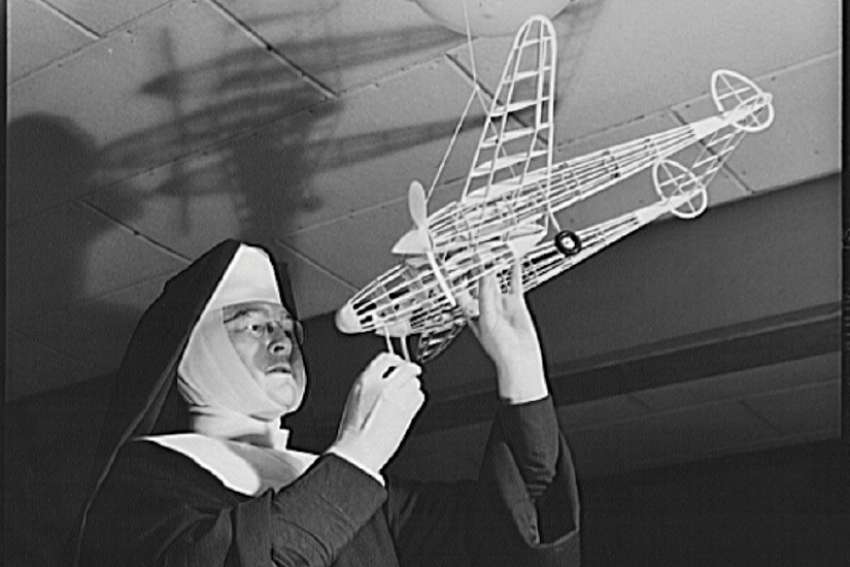MONTREAL – The education system of both Canada and the United States has neglected the training of women in science, Sr. Mary Aquinas, the first nun to fly a jet plane and a noted science education worker, said in an interview at D’Arcy McGee High School in Montreal recently.
“The one gripe I have against our education systems is that they have neglected the training of women for scientific work,” she said. “Yet today’s woman lives in a world of science. Her kitchen gadgets are scientific in origin and operation. A knowledge of science will better equip her to make use of her husband’s money.
“Women can learn science as well as men,” she contends. “And they can keep scientific secrets better than the Braves,” laughed the sturdy Ohio-born science teaching supervisor.
As well as heading the science training at Holy Family College, Manitowoc, Wis., conducted by her community, the Franciscan Sisters of Christian Charity, Aquinas travels across the States and Canada stumping for the Christian Social Living curriculum and the workshop method of teaching.
She was in Montreal conducting science workshops for all elementary teachers in the Montreal Catholic School Commission’s English section. The text books she has helped write and edit have been introduced this term for use in Grades 1-7. Montreal is the first Canadian centre to use the Christian Social Living curriculum on a cross-grade scale, and as a board unit.
“You can’t begin too young to study science,” says Aquinas. “Science is nature and children should be brought to nature at an early age. In first grade, for example, children can study plant and animal life — how to look after their pets and care for flowers. The scientific vocabulary can come from their environments. The whole program spirals until by the time they can trace air masses, have a working knowledge of wind currents and generally be aware of God’s wonders around them.”
Asked if there were such a thing as a Catholic approach to science, Aquinas replied that there was a “Christian approach.”
“All things in the universe have been made by God. Science is the study of things God has made. It is our job. as Christians, to use the things to make a better life for ourselves and for others.”
More emphasis on science must be given in elementary grades, Aquinas believes. “We must prepare our children to live in a world we ourselves do not know.”
It was for that reason that she enjoyed the jet ride. “Jet power is the power of the future,” she said. “It was to understand it better that I asked permission to travel in a jet.” Aquinas obtained her pilot’s license in 1943. She likes to try out each new type of plane as it comes off the assembly line for she thinks that anyone in the science teaching field must keep abreast of current trends.
It was this idea which led her, during the Second World War, to supplement her school’s curriculum by extending the geometry classes to include navigation and the physics classes to include meteorology.
“I took a 168-hour course with the U.S. Signal Corps so I could teach radio and aeronautics also,” she explained. “I found it so interesting that I went on to Notre Dame and I think I’m one of the few women to hold an electronics degree from that university.”
The Michigan State school inspector was so amazed at the program Aquinas had started in her school at Ironwood, Mich., that he recommended her to the Civil Aeronautics Authority in Washington.
“I was drafted,” she laughs. Soon she was travelling around the country demonstrating to other teachers how they, too, could supplement their high school curriculum by the addition of these essential subjects.
Last year she received a citation from the U.S. Air Force for the work she did during the war. Asked what prize she would like, she asked for a jet flight, thus becoming the first nun to fly in a T-33.
“We went 700 miles in 100 minutes,” she recalls. “I loved it, except that it seemed a bit lonely. The pilot I was with told me it wasn’t really lonely because ‘there’s a lot of angels and saints floating around up here with us.’
“I told him I hoped we wouldn’t meet any of them,” she stated. “But really, driving an automobile is harder than flying a plane. After all, if anything happens to you in the air, you’re on your way down anyway!”
Would Aquinas like to visit the moon? “I say to that question. ‘Come back, brother, and then I’ll go.’ I notice that the men who work on rocket research aren’t overly eager to try out their own experiments.”
(To explore more from The Catholic Register Archive, go to catholicregister.org/archive)


